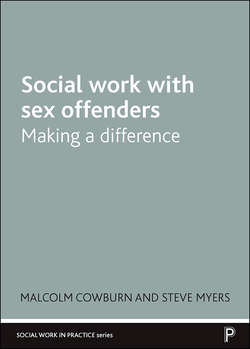Читать книгу Social Work with Sex Offenders - Cowburn Malcolm - Страница 18
На сайте Литреса книга снята с продажи.
Societal denial
ОглавлениеSocietal denial of sexual offending is the failure of governments to recognise the extent of sexually harmful behaviours in the wider population and the harmful impacts of such crimes on victims, families and communities. Cohen (2001, p 1) identifies three forms of denial: literal denial (nothing happened), interpretive denial (something happened but it is not what you think) and implicatory denial (what happened was not really bad and can be justified). A common aspect to all three forms is:
people, organisations, governments or whole societies are presented with information that is too disturbing, threatening or anomalous to be fully absorbed or openly acknowledged. The information is therefore somehow repressed, disavowed, pushed aside or reinterpreted. Or else the information ‘registers’ well enough, but its implications – cognitive, emotional or moral – are evaded, neutralised or rationalised away. (Cohen, 2000, p 1)
In relation to sex crimes, a key aspect of denial is the social construction of the sex offender as the ‘dangerous outsider’. Having neither family nor community, the sex offender and the threat s/he poses represent a denial of the fact that offenders and victims are most likely to know one another and, in many cases, be related to each other. This fact is ‘disturbing’ and ‘threatens’ the sanctity of the family as a place of safety, love and care.
